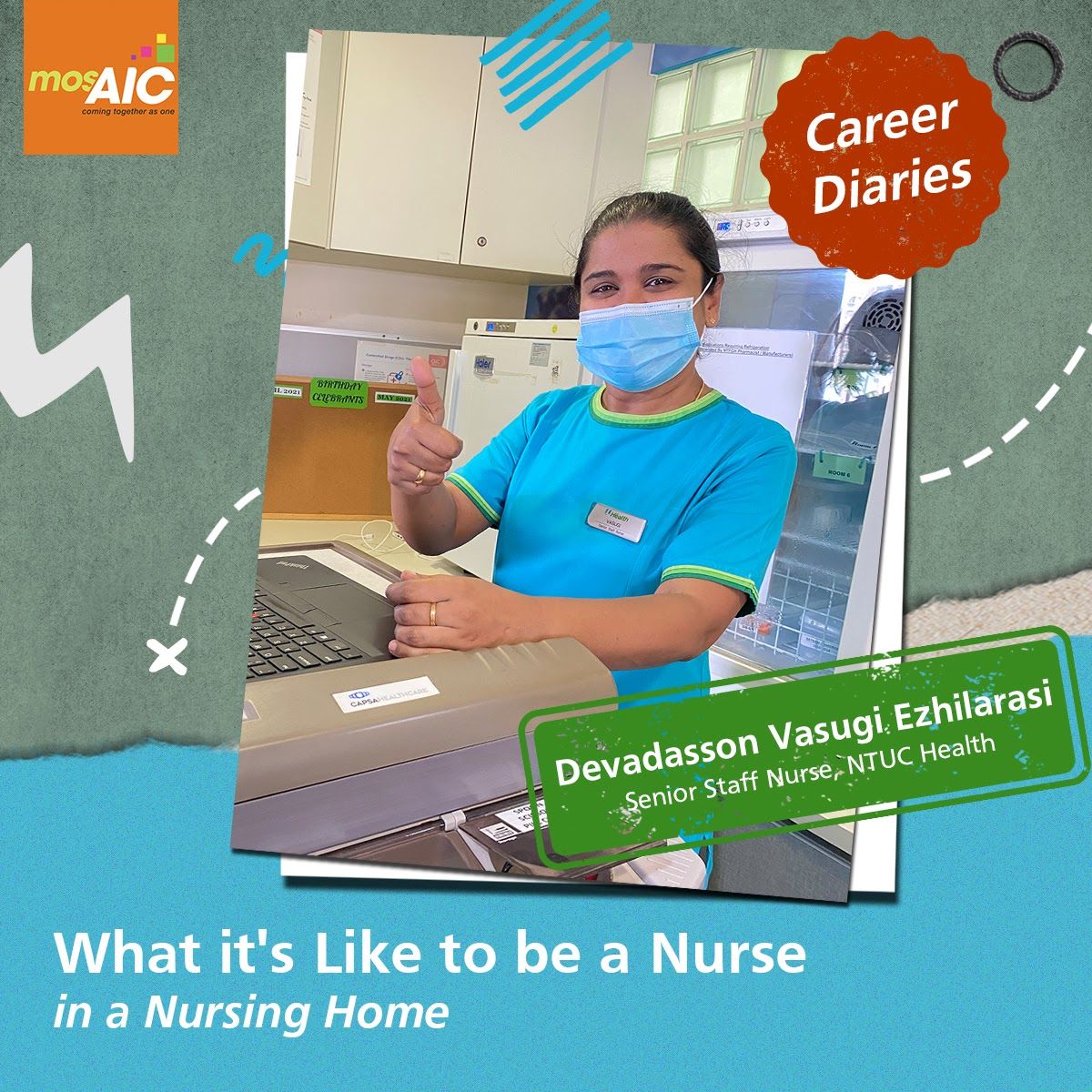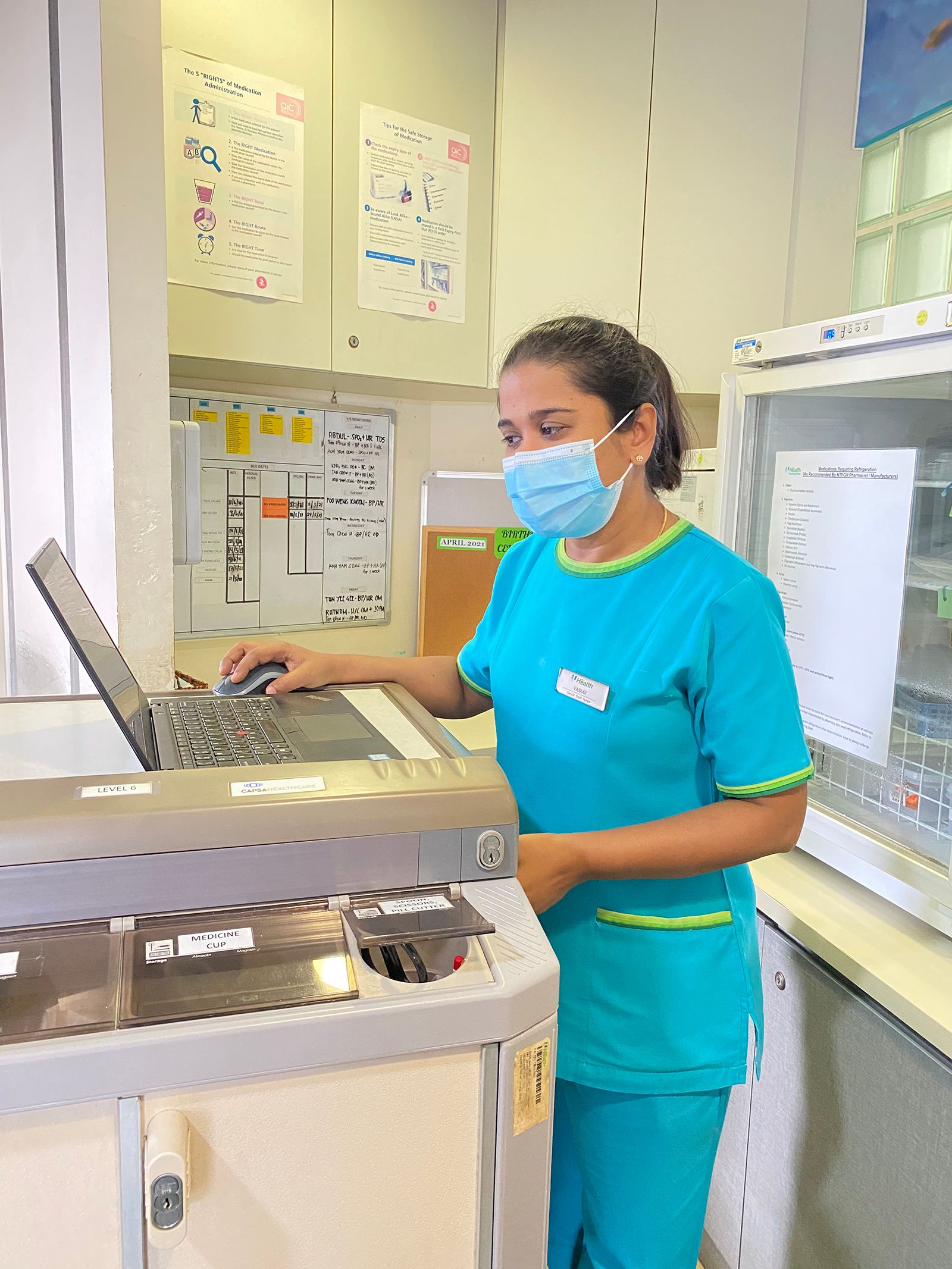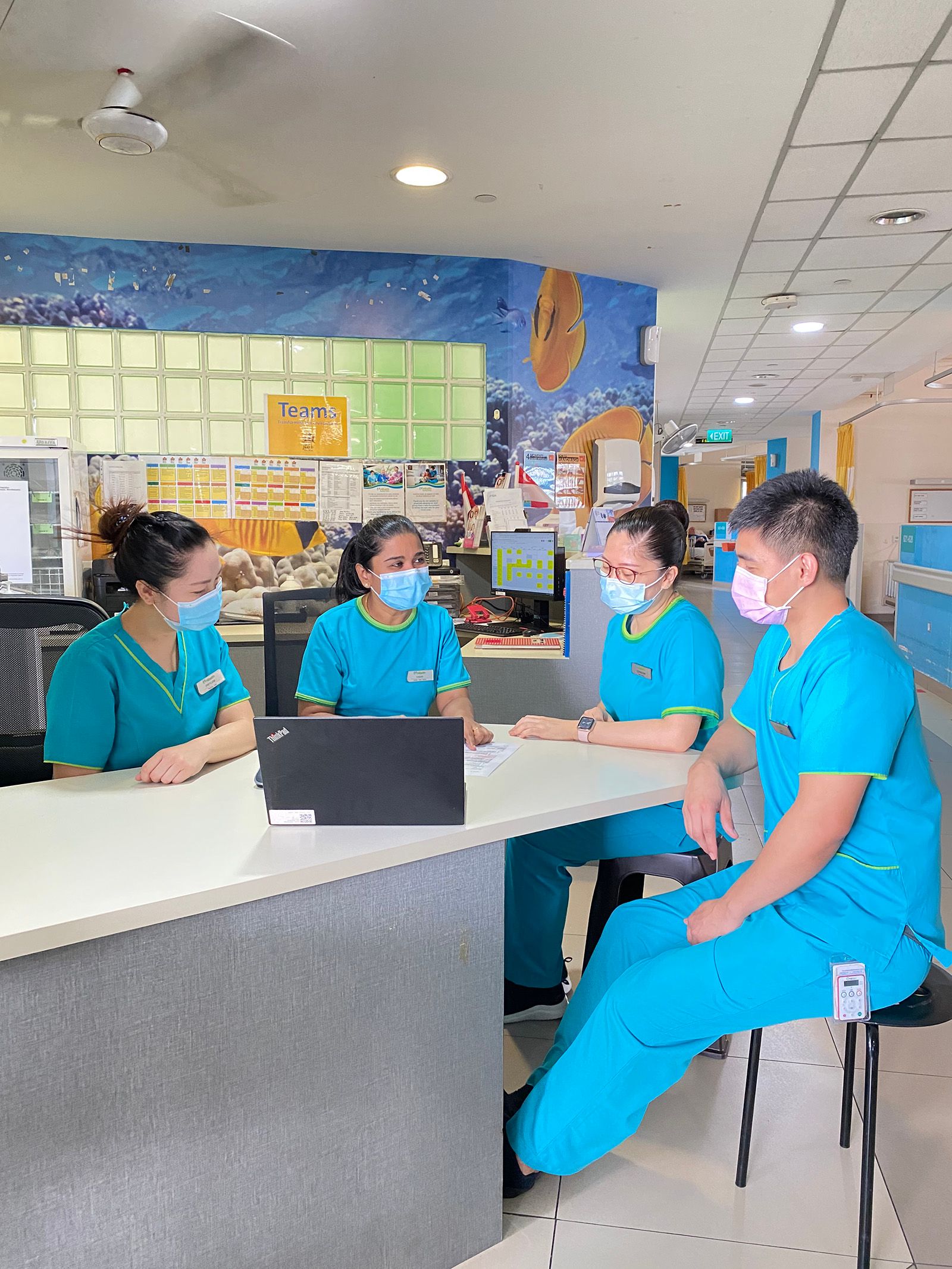Career Diaries: I'm a Nurse at a Nursing Home and This is What I've Learnt

Name: Devadasson Vasugi Ezhilarasi
Occupation: Senior Staff Nurse at NTUC Health's nursing home
Age: 44
Years of experience: 15
Education background: Advanced Diploma in Medical Surgical Nursing at Nanyang Polytechnic, Bachelor degree in Nursing at Kaplan Singapore
Years with current company: 4 years
Top 3 skills: Communication, care management, creative leadership
Best lesson learned on the job: It’s important to be patient and have an active listening ear. My passion to care for residents kept me motivated to not only persevere when the going gets tough, but also go above and beyond fulfilling my duties. Being able to deliver quality care makes me feel happy and peaceful too. I think proper time management skills and the ability to stay focussed on the task at hand are also crucial.
Why did you become a nurse?
I discovered my passion and calling for nursing when I was a child. I was very close to my grandmother, who had a hip fracture and was bedridden after an unfortunate accident. Naturally, I stepped up to take care of her. There were nurses who would routinely visit us to check in on my grandmother. Those nurses never ceased to amaze me as they would always put on a big smile on their faces while helping to alleviate some of my grandmother’s pain and providing her with companionship. I wanted to be just like them! I was very grateful and in awe of the nurses, and I recall liking their uniform and cap as well.
Was this your first job?
I started out as an acute nurse. It was eye-opening and I learned a lot on the job! I also explored hospital care and Community Care. I really enjoy my work here at NTUC Health’s nursing home now.
Growing up, what did you want to be?
Growing up, I wanted to be a nurse! My plans never changed. Besides discovering my passion to care for others, I was also attracted to the overseas career opportunities (as an Indian national) while I was schooling. Once I completed my nursing diploma in India, I jumped at the first opportunity to further pursue a nursing diploma in Nanyang Polytechnic and subsequently, a Bachelor’s Degree with Kaplan Singapore. I pursued a nursing career in Singapore thereafter.
My journey as a nurse was not easy, especially because my father initially discouraged me from becoming a nurse. He felt that it would be too labour-intensive for me as I would need to help others maintain their hygiene and even work night shifts. Despite him trying to convince me to change my profession, I was still determined to become a nurse. Throughout my journey, my mother was supportive of me and eventually, my father grew to become proud of what I do. All my experiences thus far solidified my belief to work in a career where you love what you do.
What are some of the reactions you usually get when you tell people what you do?
Most people are supportive of what I do! Others are also curious as to what exactly working as a Staff Nurse at a nursing home entails, besides overseeing feeding and maintaining our residents’ hygiene. They also ask me about how I manage my time. It is always heartwarming to receive words of encouragement and gratitude from my friends and family.
How would you describe your job to someone who has never heard of it?
As a Staff Nurse in a nursing home, you have to take care of those under your care, and that includes ensuring that our residents are served their meals in the right amounts at the right time, that they consume their medications on time, and that they are clean and happy.
On top of that, we also provide holistic care, and that includes medical, physical and spiritual care. We also engage in new initiatives such as “Fun after 7pm”, which serves to engage our residents with activities, such as Bingo, within their own wards after dinner! We are always heartened to see our residents having fun during these activities.
Ultimately, as nurses, we are the main caregivers and are fully responsible for our residents. Knowing that what we do makes a difference to their lives is very encouraging!
What are the expectations of being a Staff Nurse?
Firstly, a Staff Nurse has to be able to deliver safe, quality care to our residents. As Staff Nurses, we must be open to learning to become both a competent nurse and a critical thinker. Secondly, it is important to be alert and be proactive when it comes to anticipating any potential issues that may come up. We should be prepared to respond to emergencies at all times, and be problem solvers who find customised solutions to improve care for our residents.
Maintaining relationships and trust with our residents’ families is also important. I still vividly recall when one of my residents’ loving wife battling diabetes had to undergo a major surgery. His wife used to visit him weekly but one day, she stopped. He was visibly anxious and depressed. It was difficult when my team and I learned that she could no longer visit often as she was recovering from her surgery. She had also requested for us not to reveal her condition to him until she was able to visit him personally. Respecting her wishes, we helped her husband cope with his emotions and would check in on her periodically. Eventually, when she visited, it was a very emotional reunion.
What is the best thing about being a Staff Nurse?
The best thing about being a Staff Nurse is being able to grow as a person.
When I first started out in this job, even as a nurse from other healthcare institutions, I was new to many things and processes. However, along the way, I learned a lot and now, I am confident that I am able to handle a variety of situations. These situations could at times include life and death matters.
Since joining as a Staff Nurse, and even now a ward in-charge, I have learned a lot more about my residents and am able to think critically to recognise what my residents really need. Not only that, I believe that my growth as a person has been a very meaningful one.
Being a Staff Nurse also made me appreciate the little joys in life more. Hearing from my residents that their sons and daughters visited and seeing their cheerful faces really warms my heart.
Amidst the COVID-19 pandemic, we introduced video calls between our residents and their families. I am thankful that my residents are happy to share their joys with us. I recall interacting virtually with a resident’s newborn grandchildren during these calls too.
What was one thing about the job that surprised you after you joined?
You don’t just learn about how to care for your residents — you can fulfil your life’s purpose here! Since joining the Nursing Home, I was able to learn a lot on the job as a Staff Nurse. For instance, I learned more caregiving techniques and how to better manage my emotions. It was with this new knowledge and skills that we were able to help change our residents’ lives.
A resident of ours was admitted with a severe necrotic wound on his leg and on the brink of undergoing amputation. However, with my team’s effort and with the dressing skills applied, his wound was completely healed and he avoided the amputation!
I also pushed myself to learn Malay to better communicate with some of our residents. I feel closer to them now. Moreover, my efforts were recognised. I am grateful that I was able to receive awards and advance my career. I continued honing simple IT skills and worked on my leadership skills. I am grateful to NTUC Health for the chance to explore and learn many things here.
Describe what a day in your life is like.
We have three shifts: morning shift, afternoon shift, and night shift. The things I do vary from day to day, but here's what a day in my life during a morning shift is like.
6am: I wake up, freshen up, pray and read the bible.
7am: I leave home and take the bus to travel to NTUC Health’s Nursing Home.
7.30am: We start our roll call. Our Staff Nurses from the night shift will update us of our residents’ conditions, and highlight anything else of concern. We also discuss events for the day such as meetings, talks and vaccinations. After our roll call, we begin checking on all residents personally and give them their medication (where necessary).
9am: In view of the COVID-19 situation, we check our residents’ body temperatures twice a day and keep a lookout for any acute respiratory infection (ARI) symptoms such as fever and cough. If so, the doctor and their loved ones will be informed. The affected residents will be isolated and undergo swab testing. Donning our personal protective equipment (PPE), we will provide medical treatment, as well as closely monitor and update our residents’ health status. Visitors are strictly not allowed to visit should they display ARI symptoms.
10am: We bring our residents to the Day Space to eat breakfast. I supervise the meal session and ensure that the food is consistent and of good quality, and that there are no potential choking hazards. I will also observe if our residents are eating well.
11am: We then prepare our residents’ medical documents to facilitate our doctors’ visits. As the doctors make their rounds, we also update them about our residents’ conditions. Should the doctor prescribe our residents medication, we will have to update the pharmacy in order to retrieve the medications. Afterwards, we’ll dress the residents and I will update our residents’ records accordingly — we keep track of all our residents’ conditions daily.

12.30pm - 1pm:
It is now lunch time for our residents. We ensure that they eat well and that the food consumed is acceptable and safe.
1pm - 1.30pm: I have my lunch during this period, and I will catch up with my family and friends.
1.30pm: After lunch, I will oversee the diaper-changing process. Afterwards, the Staff Nurses and I begin to write daily reports on every resident, which detail whether their health condition is improving or affected.
3pm: Around this time, we also have a roll call with the afternoon shift Staff Nurses, during which we update them about what needs to be done on that day, and our residents’ status. We do a handover of duties to ensure a continuity of care for our residents. We are also scheduled to help disinfect the visitor’s area (a place where our residents can see their next-of-kin through a divider with a mask on). Before I realised it, it is nearing the end of my shift.

4.30pm - 5.30pm: I start on my paperwork, check if there are any updates on new advisories and in-service education, and attend meetings.
5.30pm: It's time for me to knock off and prepare to fulfil my other role: a wife and a mother.
6pm - 10pm: During this period, I spend my time with my children, help them with their schoolwork, and do some housework. Afterwards, I get ready to sleep.
If you’re inspired by Senior Staff Nurse Vasugi and wish to find out more about careers in a nursing home, good news: NTUC Health is opening two new nursing homes in Lakeside and Tampines in August 2021! Click the links to apply as a Staff Nurse or a Nurse Manager!
